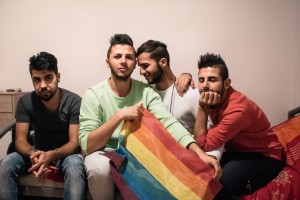LGBTQI refugees suffer assault inside camps
Gay and lesbian asylum seekers in Germany are being both physically and emotionally abused by fellow refugees due to their sexuality.
As more people flee violence in their home countries of Syria, Iraq and Afghanistan to seek safety in Europe, crowded camps and accommodation for a diversity of people is proving to create even more violence.
In the German city of Dresden, at least seven gay asylum seekers have had to be relocated to different shelters for their safety in this year alone.
One such victim of abuse was Syrian refugee Rami Ktifan, a 23-year-old university student who thought being in Germany meant he could finally be open about his sexuality.
After a fellow refugee found a rainbow flag amongst Rami’s possessions he was honest about its meaning.
“I decided to tell the truth, that it is the flag for gay people like me,” Rami told The Washington Post.
“I thought, I am in Europe now. In Germany, I should not have to hide anymore.”
As a result, Rami was forced to endure physical and emotional abuse over the weeks that followed, including an attempt to burn his feet in the middle of the night.
The abuse became so extreme that Rami and two other openly gay refugees were relocated to separate accommodation with the help of a local gay activist group.
Rami’s story is far from unique, with the dangers of being openly gay in European refugee centres increasing as the already overflowing accommodation take more refugees in.
While there are no official figures, the Lesbian and Gay Federation of Berlin and Brandenburg report dealing with between three and six new cases a week where gay asylum seekers have suffered physical and sexual abuse.
“Just like everyone else, with the refugees, there are good ones and bad ones, and there are those who are carrying homophobic attitudes from their homelands,” said Jouanna Hassoun, head of the Berlin gay federation’s migrant program.
“Those attitudes won’t be abandoned immediately.”
A record number of gay and lesbian asylum seekers will arrive in Germany this year, with experts estimating that 50,000 will reach the European nation accepting the largest amount of refugees.
Due to the increasing abuse and rise in refugees, Berlin officials aim to create the city’s first refugee centre exclusively for gay and lesbians.
The necessity of going to these extremities has become a key point of argument in how to integrate the largest flow of refugees in Europe since World War II.
Even Europe’s political right are advocating for gay rights, based on the argument that accepting ‘too many’ asylum seekers creates dangers through conflicting views such as abuse against gays.
Being that the large majority of asylum seekers arriving in Europe come from nations in the Middle East and Africa that often have very different laws and views on gays and women, the question of integration is filled with layers.
European countries such as Germany, which is led by a female and chancellor and offers legal benefits to same-sex couples, have sharply contrasting laws to nations such as Iran and Uganda where gays face persecution.
Due to the diversity of opinions and views among both the increasing refugee population and Germany’s population, the process of integration becomes increasingly complicated.
“You must forget what you learned at home about what is right or wrong,” wrote commentator Harald Martenstein in the Berlin daily Der Tagesspiegel, addressing refugees.
“You do not have to give up your culture, not that. But you must accept the equality of women. You must learn that homosexuals and Jews are just like everyone else. You must bear mocking and satire, even when it concerns your religion. . . . If you don’t accept these rules, you have no future here.”
Ruby Brown
AMES Australia Staff Writer













